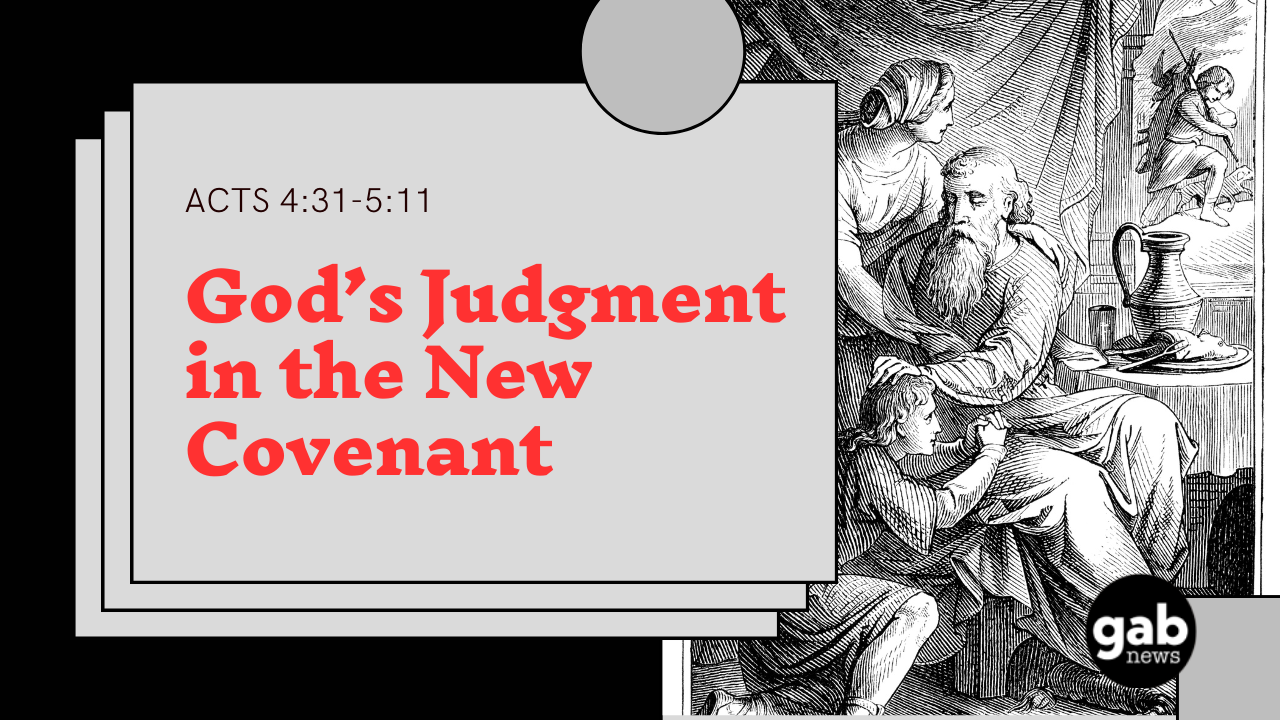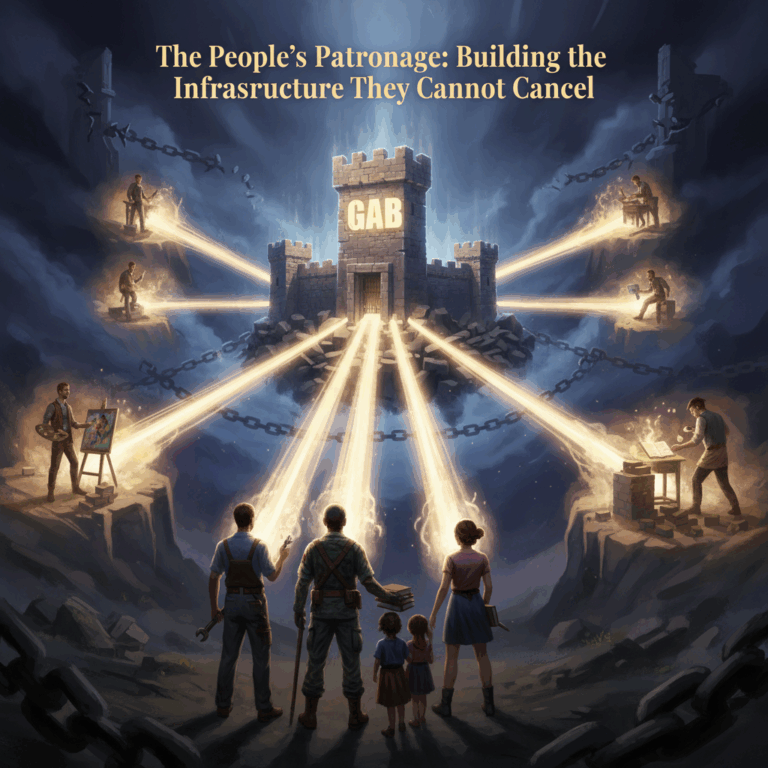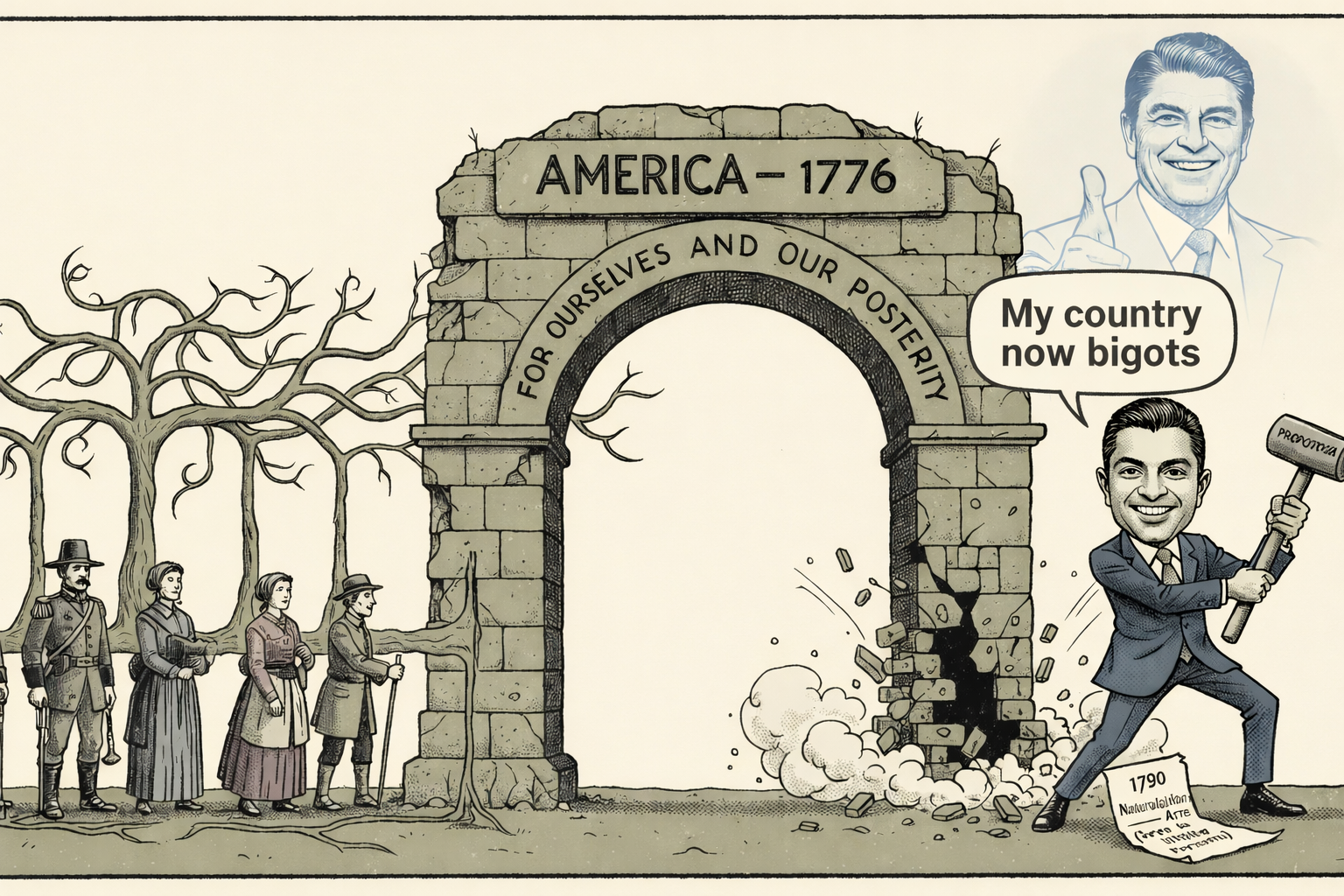Introduction
In Acts, the church is the New Covenant People of God. God’s people are in a similar situation as Israel in the book of Joshua. Jesus has crossed the Red Sea of death and led us through the wilderness, but at the beginning of the book He has ascended, like Moses ascended the mountain. Now the apostles are told to be strong and courageous and the Holy Spirit has been poured out among them. The previous chapter ended with worship resulting in an earthquake that shook the city, just as worship and an earthquake shook the walls of Jericho. In this passage, we see yet another parallel to the book of Joshua, but only if we have eyes of faith formed by meditating upon the Word of God.
32 Now the multitude of those who believed were of one heart and one soul; neither did anyone say that any of the things he possessed was his own, but they had all things in common. 33 And with great power the apostles gave witness to the resurrection of the Lord Jesus. And great grace was upon them all. 34 Nor was there anyone among them who lacked; for all who were possessors of lands or houses sold them, and brought the proceeds of the things that were sold, 35 and laid them at the apostles’ feet; and they distributed to each as anyone had need.
36 And Joses, who was also named Barnabas by the apostles (which is translated Son of Encouragement), a Levite of the country of Cyprus, 37 having land, sold it, and brought the money and laid it at the apostles’ feet.
5 But a certain man named Ananias, with Sapphira his wife, sold a possession. 2 And he kept back part of the proceeds, his wife also being aware of it, and brought a certain part and laid it at the apostles’ feet. 3 But Peter said, “Ananias, why has Satan filled your heart to lie to the Holy Spirit and keep back part of the price of the land for yourself? 4 While it remained, was it not your own? And after it was sold, was it not in your own control? Why have you conceived this thing in your heart? You have not lied to men but to God.”
5 Then Ananias, hearing these words, fell down and breathed his last. So great fear came upon all those who heard these things. 6 And the young men arose and wrapped him up, carried him out, and buried him.
7 Now it was about three hours later when his wife came in, not knowing what had happened. 8 And Peter answered her, “Tell me whether you sold the land for so much?”
She said, “Yes, for so much.”
9 Then Peter said to her, “How is it that you have agreed together to test the Spirit of the Lord? Look, the feet of those who have buried your husband are at the door, and they will carry you out.” 10 Then immediately she fell down at his feet and breathed her last. And the young men came in and found her dead, and carrying her out, buried her by her husband. 11 So great fear came upon all the church and upon all who heard these things.
Acts 4:32-5:11
Unity of the Church (v. 4:32-37)
We are told that the multitude of those who believed were of one heart and one soul. Stop for a second and think about this. This is 8-10,000 people, maybe more. Often we read this and imagine that this is just the apostles and a handful of people around them in the Upper Room, but it is thousands. And they are all united together for the single purpose of announcing the victory of Jesus Christ and the His Kingdom. In this moment, none of their possessions they treated as their own. They kept all things in common.
Like the previous passage in Acts 2, this throws a lot of people off, especially after the revolutionary movements of the modern age. Does the gospel mean an abolition of private property? Is this the New Testament’s model of how we are to live today? Again, you have to remember this historical moment and what it was. This is the new army of Israel conquering Canaan. These ten thousand people have great possessions in Jerusalem, a city they know is doomed to destruction because Jesus said it would be.
Luke, the same author of Acts, tells us:
19:41 Now as He drew near, He saw the city and wept over it, 42 saying, “If you had known, even you, especially in this your day, the things that make for your peace! But now they are hidden from your eyes. 43 For days will come upon you when your enemies will build an embankment around you, surround you and close you in on every side, 44 and level you, and your children within you, to the ground; and they will not leave in you one stone upon another, because you did not know the time of your visitation.”
In Matthew, Jesus tells them the timeframe of this destruction, within this generation. The thing is known. Jerusalem is doomed. All that property is going to very soon have a value of zero. So when the members of the church are selling their property, what are they doing? They are plundering the Canaanites devoted to destruction. And when Israel plundered Canaan, where did they take the loot? They devoted it to the Lord. That is what is going on here, not a model for a utopian society. You do not see Paul commanding any of the churches in the cities of the Oikoumene (the larger Greco-Roman world) to live in this manner. On the contrary, multiple times he commanded people to work for a living. But here in Jerusalem, ground zero of the Kingdom’s invasion of the whole world, the church is being built up by the treasures of the victory of Christ’s resurrection.
A man named Joses joins them. He is given a new name by the apostles, a Hebraic or Aramaic name, Bar-Nabas, which means “Son of Encouragement.” This man is a Levite from the diaspora residing in Cyprus. Presumably, he is a wealthy man with property in Jerusalem which he sold and laid all of it at the apostle’s feet. The Levites were the priestly tribe, and their inheritance in Israel was not from land, but the responsibility of caring for the Tabernacle and temple, and the teaching of the Law. And here, a faithful Levite is fulfilling that duty, caring for the New Temple, the people of God united to Jesus Christ.
Ananias and Sapphira (5:1-11)
But Barnabas is contrasted with a man and his wife named Ananias and Sapphira. They too sold a large possession. And Ananias “kept back” part of the proceeds, with his wife knowing fully what he had done, bringing a portion to the apostles. Peter asks Ananias why Satan has filled his heart to lie to the Holy Spirit and keep back part of the land for himself. He tells him that it was his possession to do with what he wants. This statement undoes any idea that the supposed communism of the early church was mandated. This was all entirely voluntary. It is his land and his money. He could keep all of it if he wanted to. And he chose to lie and say that it was the entirety of his wealth. And he was not lying to mere men but to God Himself.
Upon hearing this, Ananias falls down dead. And we are told great fear came upon all those who heard these things. Remember, Rahab tells the spies in Joshua 2 that the men of Canaan were in great fear of the Israelites because they knew what God had done for them and that He promised to give them the land. Here great fear is falling upon everyone because they see the power that God is working through the Apostles by the Holy Spirit.
Three hours later—notice the number three, so often used in the Bible to indicate a time of judgment—Ananias’s wife, Sapphira, appears to the apostles, not knowing what had happened to her husband. Peter asks her if she really sold the land for the price they said. She told him they did. He tells her that the feet of the men who carried out her dead husband have come to take her out. She too, like her husband, fell down dead. And again we are told that great fear came upon everyone, not just the church, but upon “all those who heard these things.”
Conclusion
Why is this story included in the Book of Acts? We are told the Holy Spirit worked many wonders and not all of them made it into Luke’s account. So why this one? It is because it builds the parallel between Joshua and Acts. Ananias is a new Achan. God had commanded that all the spoils of Jericho be brought to Him. But Achan had kept back some of the silver and gold he found there for himself and buried it under his tent. God punishes Israel and defeats them in battle because of Achan’s sin, and commands Joshua to bring all Israel out according to their tribes, where it is discovered by lots who has done wickedly.
You will notice that Acts began with the casting of lots to determine God’s will of who would replace Judas among the apostles. But in the Acts version of the story of Achan, it is not determined by lot, but directly revealed to Peter by the Spirit. When things are in parallel like this, the discontinuities are as important as the similarities.
Achan is discovered and confesses his sin, but punishment is still carried out. He and his children are taken, along with his oxen, donkeys, sheep, his tent, and all his possessions, and they are stoned to death and then burned. We look at this scene and view it as harsh. Why his children too? The presumption is that they are complicit in Achan’s sin. In the Acts version, what can be assumed in Joshua is made clear, Sapphira was complicit in the treachery.
But what is the point of both stories? God had taken Israel and promised to give her a rich and bountiful land, a land filled with wealth. But Achan did not trust these promises. He saw a giant wedge of gold and a bunch of silver and said, I can get financial security for my family. I do not have to trust that God will provide for us in the land He is giving us. I can have it right here and right now.
Similarly, Ananias does not actually trust what God is doing in Jerusalem. He does not trust that the gospel is going to conquer and have victory. He wants to have high status in the church and makes it look like he has given all he has to the cause of Christ, but his heart believes he has to look out for himself. Ananias is hedging his bets. Maybe Christ didn’t really rise from the dead and now rules. I need to keep this wealth just in case.
It is a profound thing to sell all your earthly possessions and give them to the church. Then and now. Think of it, for generations your ancestors toiled and built up wealth, handing it all to you to do the same. And all of that, generations of sweat and hard work you are selling and giving away. Imagine doing that now. Imagine selling your house, all your savings, your retirement account, your car, your toys, every, single thing you have and putting it in the offering plate. What are you doing if you do that? You are saying “I am going to trust God entirely to provide for me and care for me. All the security I have from my possessions I am giving up and offering myself entirely to rely on His grace.”
Now, I am not saying that you should do this. Scripture says a righteous man leaves an inheritance to his children and his children’s children. It is a matter of prudence and there are generations after you who will need to build upon the work you have done. We are not in the same situation as Achan or Ananias. We have not been commanded to devote everything to the Tabernacle, nor are we told explicitly that all our possessions are very soon going to be destroyed.
But the similarity we do have is that we live in a people totally devoted to Mammon. We want the security that wealth brings, just as Achan and Ananias did. We do share that with them. But what does that security so often do? God tells Israel that when they get into the land, they will forget Him, and His law, and worship other gods, saying “my own hand has gotten me this wealth.” Well doesn’t that sound familiar? God blessed our land with nearly a century of unprecedented prosperity, and what have we done? We have forsaken Him, almost entirely. We collectively have been Achan. We collectively have been Ananias. We worship wealth and forget God.
So what does God do when a people do this? He takes away the good times and brings hard times. We are entering an age where the acquisition of wealth is not so easy. The median household income required to purchase a home today is north of six figures. I remember my parents telling me about interest rates before I was born being 15 or 20%. We are heading closer and closer to that. But the difference is the homes available then were worth a full year’s salary whereas today they are worth five or ten years’ salary. And many people simply cannot afford to find a place to live. That is on top of the costs of everything skyrocketing while wages do not keep up the same pace. Is all this outside of God’s control? Of course not.
We enjoyed the seven years of plenty and did all we could to spurn Him because of it, and now, now we are entering the seven years of famine. He is forcing us into a place where we can do nothing else but trust Him to provide for us. He is forcing us into the place where the faithful in Joshua and the faithful, like Barnabas, already were of their own volition.
And so the charge to you is this, to take an account of your own heart. Do I trust in myself and the wealth I have acquired for my security? Do I think nothing will ever befall me? You must know, deep in your heart, that everything you have both what you have already earned and the skills and abilities God has given you to produce wealth in the future, all of this is a grace from Him. All the wealth belongs to God, even what you have sweated and toiled for. It is a grace to you that you have any of it. It is a grace that you have the ability to work so hard to make it. Recognize this and be freed from the deceitfulness of riches. Recognize that God gives and that God loves to give to His people, and so much more than the pitiful prosperity gospel preachers will say, actually. He loves to bless His people, even in this world and especially in the next. And rely upon Him and not upon your own strength. In the Name of the Father, the Son, and the Holy Spirit. Amen!

Andrew Isker is the pastor of 4th Street Evangelical Church in Waseca, MN. He is a graduate of Minnesota State University and Greyfriar’s Hall Ministerial Training School, and he has served churches in Missouri, West Virginia, and Minnesota. He is the author (with Andrew Torba) of Christian Nationalism, and the author of the forthcoming book, The Boniface Option. Andrew, his wife Kara, and their five children reside in his hometown of Waseca, MN. He can be found on Gab @BonifaceOption.





